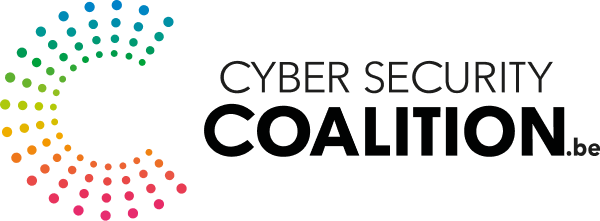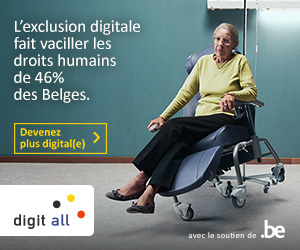DigitAll: 100 organisations unite against the widening digital divide in Belgium
3 min leestijd
DigitAll, the coalition for greater digital inclusion in Belgium, is launching an awareness campaign this year to put the digital divide back on the agenda. Figures show that the number of Belgians at risk of digital exclusion is growing rapidly. Through four real-life testimonies, DigitAll wants to make organizations and citizens aware of this form of exclusion and encourage them to take action.
The King Baudouin Foundation’s ‘Digital Inclusion Barometer 2022’[1] has revealed a worrying trend: between 2019 and 2021, the number of Belgians at risk of digital exclusion rose from 40% to 46%. Digitalization is advancing at lightning speed, and the digital divide is only widening. Digital exclusion does not only affect vulnerable groups, but occurs in all strata of society in Belgium.
Four real life stories
Starting today, DigitAll is launching an awareness campaign to make the digital divide more visible among a wider audience. DigitAll is an ecosystem of companies, organizations and government agencies working together to promote digital inclusion in Belgium. The growing number of organizations involved in the initiative currently stands at 100, up from just 70 a year ago.
Petra De Sutter, Deputy Prime Minister and Minister of Public Administration, Public Enterprises, Telecommunication and the Postal Services: ‘When people are excluded digitally, they are excluded from society. It’s like missing a key to enter a house,’ says Telecoms Minister Petra De Sutter. ‘And yes, it is about so much more than not having a laptop or smartphone as Chantal, Sura, Yousra and Stijn confirm. Their brave testimonies show that digitalization goes so much further. It is a battle for equality and inclusion.’
The awareness campaign tells the story of four people whose lives and rights have been directly affected by digital technology. They agreed to testify and tell their stories.
Chantal sees her right to healthcare affected by the difficulties she faces in using digital tools to book a doctor’s appointment, get her results and communicate with her health insurance fund.
Sura, whose innocent photos of herself were stolen from her social media profile and used on other sites without her knowledge.
Yousra had to fight for her right to education for a long time. Without a computer, she had to do her homework and school assignments on her mobile phone. This was especially difficult for her final paper, which was 80 pages long.
Stijn did not have the skills to apply online, nor did he have sufficient knowledge of the programmes required for the job, and so his right to work was directly affected.
Of course, it is not just about raising awareness. “All participating organizations will also communicate about what actions they themselves are taking to promote digital inclusion,” explain Linde Verheyden and Catherine Bals of DigitAll. “They do this, for example, by providing information, organizing training and making resources available.”
Laurent Loncke, General Manager Retail Banking at BNP Paribas Fortis: “The digital world is developing at lightning speed and occupies an increasingly important place in our daily lives. That is why we think it is important to participate in this important social challenge through DigitAll: how do we get as many people as possible on board and how can we still offer a good service to the digitally inactive Belgians? DigitAll’s broad network enables us to realize projects with a high impact.”
Jan De Blauwe, Chair Cyber Security Coalition: “Acquiring skills to navigate the digital world can present a significant obstacle for digitally excluded people. By making cybersecurity more accessible and inclusive, the Coalition aims for a more equitable and secure digital environment for everyone. A recent Coalition initiative to this end is ‘Stay safe online‘, a series of simple online safety courses accessible to everyone.”
Digital exclusion is a threat to human rights
The King Baudouin Foundation study mentioned above shows that digital exclusion has several causes. Lack of technological means or the necessary skills are the most obvious ones.
The Corona crisis has accelerated digitalization. It was useful for those who were already on the digital train, but less so for those who did not have access to it or did not have the skills and were excluded from interacting with society and exercising their human rights.
According to the study, inadequate access to the Internet remains an important factor. It is not only about the quality of technological resources, but also about the quality of access to the Internet, in particular the network or environment. Furthermore, our digital skills are under pressure due to the high demands of digital technology. There is a need to constantly update acquired skills. Interestingly, digital skills are also declining among young people. In 2022, 33% of young people aged 16-24 had weak overall digital skills (compared to 21% in 2019).
The situation is also worrying among job seekers. More than half (52%) of them have weak digital skills, a figure that rises to 74% for low-skilled jobseekers. For example, using email or word processing is not a natural skill. 46% of the unemployed do not use a word processor even though it is necessary when applying for jobs, which are often done online.
Linde Verheyden and Catherine Bals: “The findings and figures in the study have to make everybody aware that the digital divide is not linked to age or social background. It can affect anyone. With this campaign, we want to raise awareness of these issues among the general public and encourage organizations and individuals to take action.”
More info on DigitAll: digitall.be/
[1] Faure, L., Brotcorne, P., Vendramin, P., Mariën, I., & Dedonder, J. (2022). Digital Inclusion Barometer 2022 (D/2893/2022/18). King Baudouin Foundation. Accessed 4 July 2023, from https://media.kbs-frb.be/nl/media/9837/Digitale%20Inclusie.%20Barometer%20Digitale%20Inclusie%202022


